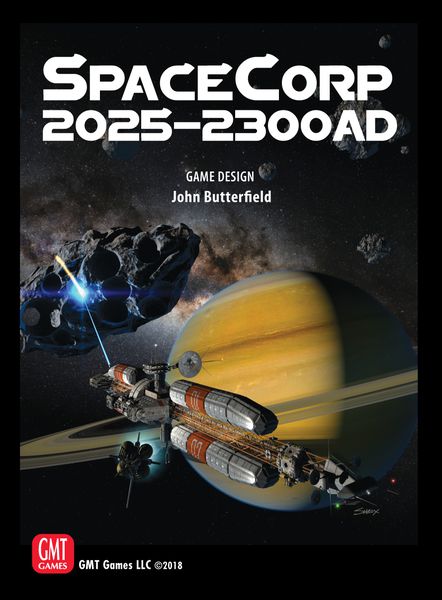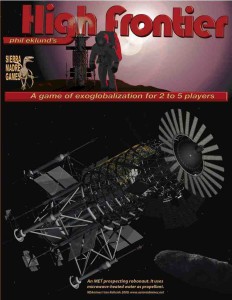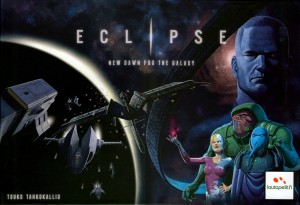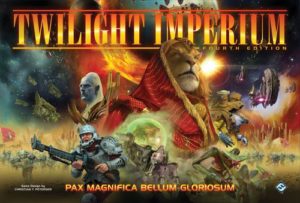- Learning time
- 40 minutes
- First play time
- 220 minutes
SpaceCorp
Designed by: John H. Butterfield
SpaceCorp is an epic exploration game, where – in the not-too-distant-future – you sail out into the cosmos, first in our own galaxy, before moving on into the stars…
Unlike many space games, there is no combat, no dice-rolling, no feats of derring-do. Instead, SpaceCorp takes you on a journey of discovery, crossing vast distances, exploring planets and moons, building bases and – the game’s brutal objective beneath the starry blanket on the surface – making money.
The first board (there are three!) shows Earth and the nearby planets. Each player has a card or two in their hand to begin with, plus one laid out on their player board in front of them that shows their infrastructure (or infra: more on that momentarily) Your ships (or teams, as the game refers to them) begin on the home planet. Although there are some intricacies around the outside, the core of SpaceCorp is simple: on your turn, take a single action, powered by either cards in your hand and/or the cards in your infrastructure: the only difference is cards in your infrastructure remain there, and aren’t lost.
The cards each show which action they can power (often more than one), and actions aren’t complex at all: Move a team in space, following some simple movement rules. Explore a location you’ve landed on. Build a base there (there are several types of bases, each with a different potential benefit) or Produce: harvesting cash from previously-built bases. Along with Research (get more cards!) these are the actions you’ll mostly be using, although others are available: you can upgrade by adding a card to your infrastructure and making it more powerful. And when you reach the second board (the outer planets), you can advance your genetic engineering or revelation markers to gather bonus cards that make future turns more powerful.
Reaching the second board can be triggered either when cards run out, or six of the seven business contracts are fulfilled. Despite the underwhelming terminology, these are both a. important and b. easy to understand: they simply give everyone objectives to meet, and the first player to do so claims the contract, getting a cash reward. Each of SpaceCorp’s three boards has different contracts to fulfill, and each board also introduces some new elements too: on the second board the cards mentioned above, on the third the additional option of building colonies, that score cash both during and at the end of the game.
Throughout the game there is the option to use another player’s infrastructure on your own turn: meaning that with four players especially, you have more flexibility than just the cards in your hand and own infrastructure – using another player’s infra, however, does reward them with a card, and cards are the fuel that power your game, quite literally at times.
After the third board is played (note here SpaceCorp does provide rules for both single and double-board versions as well) the player with the most cash wins.
Joe says
I enjoyed this a lot- I love the piggybacking on other players infrastructure, and the cards are excellently designed to be able to be quickly read from the other side of the table. However, the 'different boards for different stages of the game' thing felt a bit underwhelming in the end. Despite trying hard, it ends up not feeling quite as epic as it should. But I'd like to play again.
The guru's verdict
-
Take That!
Take That!
No direct conflict, but players can hamper each other a little in the race to grab those Business Contracts.
-
Fidget Factor!
Fidget Factor!
Despite it's appearance as a 'heavy' game, SpaceCorp moves reasonably quickly even on a first play, after a few rounds. Familiarity speeds it up even more.
-
Brain Burn!
Brain Burn!
It's a race, with luck-pushing and tactical manouevering intact. But it's not that tough on the brain (though travelling the stars can get a bit mathsy, as one might expect of rocket science)
-
Again Again!
Again Again!
You can play a single, or double, or triple board experience. We'd probably say for the deep-space experience it's best going for the whole shebang: long, for sure, but fast-moving and immersive.















Sam says
GMT - the publisher of SpaceCorp - are renowned for their intricate, cognitive-heavy war games such as Cuba Libre, and the initial impression here was of something that was going to take all day to learn and another to play. So it was a surprise to find just how breezy SpaceCorp is: turns are logical and intuitive, and though there is a fair bit more going on than described above - this is no place for a full rules-rundown! - the heart of it is simple. For a big beastly space game I thought I might miss the feisty combat of something like Eclipse, where players are inexorably drawn into an epic bunfight, but SpaceCorp is more a story of discovery and in those terms it succeeds very well. Beautifully presented too.